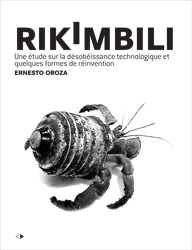RIKIMBILI. Une étude sur la désobéissance technologique et quelques formes de réinvention. 2009
Ernesto Oroza
(Préfacier) Marie-Haude Caraës
Traducteur: Nicole Marchand-Zanartu
67 p.
format : 165 x 215
ISBN : 978-2-86272-527-7
Publications de l’Université de Saint-Étienne, 2009
Cité du design
BUY

“Quand nous acceptons le critère bourgeois qui sanctionne la nécessité comme indigne et celui qui exprime ses besoins comme faible et vulgaire, nous participons à la réduction systématique de la créativité et de la liberté qui pourrait se traduire dans la culture contemporaine.” Ernesto Oroza
“PLOUGHSHARES AS TECHNOLOGICAL DISOBEDIENCE (CUBA)
Cite du design is a broad church. Whilst hordes of courtiers flocked around the Minister like starlings at sunset, copies of a subversive new book, by Ernesto Oroza, were being distributed by Cite’s publications team. Rikimbili – “a study of technological disobedience and other forms of re-invention” – describes how Cubans have adapted and recycled industrial objects during fifty years of US sanctions. The book’s title, Rikimbili, is named after a two-wheeled vehicle that started its life as a bicycle. The book is subversive because, for me anyway, it describes the kind of design we’ll be doing in the coming age of scarcity industrialism (a phrase of John Michael Greer). Design shows filled with shiny objects, by contrast, are best perceived as historical events about a pardigm that has passed. Write direct to obtain your copy of Rikimbili to: emilie.chabert at citedudesign dot com.”
John Thackara
from: doorsofperception.com
[printfriendly]